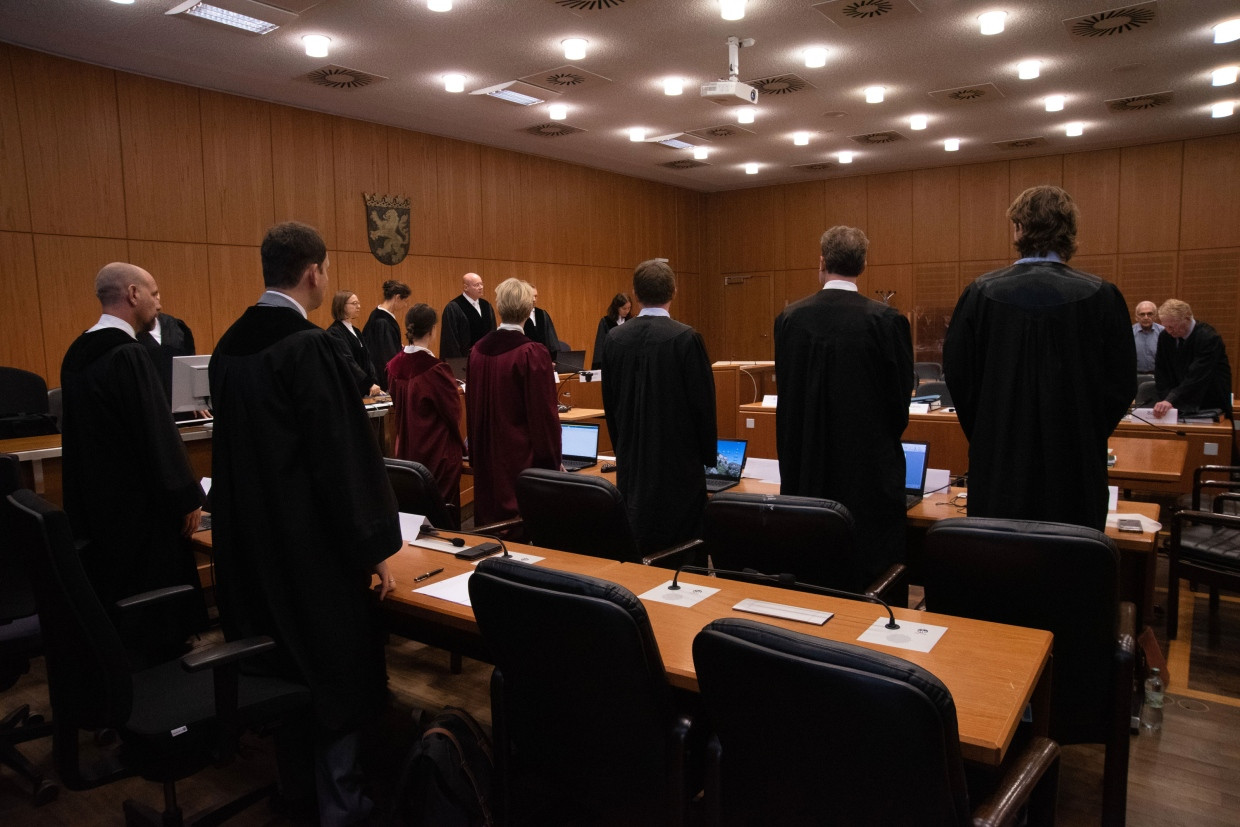In Woche eins der Post-Assad-Ära scheint am Oberlandesgericht Frankfurt am Main im seit bald drei Jahren währenden Prozess wegen Foltervorwürfen gegen einen syrischen Arzt business as usual angesagt zu sein. Alle Verfahrensbeteiligten machen den Eindruck, als spiele es keine Rolle, dass sich am vergangenen Sonntag das Leben der Syrer grundlegend verändert hat.
Weder der Senat unter dem Vorsitz von Christoph Koller äußert sich zu den Ereignissen, noch Staatsanwältin Anna Zabeck. Auch der Angeklagte Alaa M. oder seine Verteidiger haben kein Mitteilungsbedürfnis. An diesem Donnerstag wird an Prozesstag 164 ein Arzt vernommen, der in den Jahren 2011 bis 2013 in unterschiedlichen Militärkrankenhäusern gearbeitet hat. Dann verließ er seine Heimat, da er ein Gegner Assads war. Mittlerweile ist er in Deutschland eingebürgert.
Erst druckst er herum, dann fasst er sich ein Herz
Bis zur ersten Pause gestaltet sich die Aussage zäh, mit vielen Nachfragen der Richter. Manchmal wird auch der Übersetzer für die arabische Sprache hinzugezogen, obwohl der Zeuge gut Deutsch spricht. Als alle Verfahrensbeteiligten um 11.30 Uhr in den Saal zurückkehren, wiedereröffnet Richter Koller die Sitzung mit der Feststellung, er habe den Zeugen gerade in der Gerichtscafeteria getroffen. Dort habe dieser Worte an ihn gerichtet, die er bitte wiederholen solle. Der 40 Jahre alte Mann kommt dem nach und sagt: „Ich kann das erste Mal frei sprechen, weil Assad weg ist.“
Bei seiner weiteren Befragung stellt sich dann aber heraus, dass er gar nicht so frei spricht, immer wieder herumdruckst. Nach Rücksprache mit seiner Zeugenbeiständin fasst er sich dann ein Herz. Im Sommer sei er aus dem Umfeld des Angeklagten kontaktiert worden. Dessen Familie und seine kennen sich weitläufig. Ihm werde fälschlicherweise vorgeworfen, dass er zur Inhaftierung von M. beigetragen habe, und er habe Angst vor Vergeltung.

One might think that the balance of power in Syria should be irrelevant when testifying before a German court. But far from it. The Senate had to deal with the problem again and again: How do you convince a person who is afraid for himself and his family to testify comprehensively and truthfully?
Many witnesses told the Senate that relatives in Syria were visited by secret service agents. Their job: intimidation, threat. The witnesses themselves, all of whom were based in European countries, were often accompanied to court by BKA officials for their protection. The chairman now also offers this option to the current witness. It looks like the old days cannot be overcome so quickly.
The Senate is keeping a low profile
When asked by the FAZ whether the upheaval in Syria could have an impact on the trial, which is probably in the final third, the presiding judge Koller said that it was very possible that the current political developments in Syria would lead to “changes in relation to the assessment of current threat situations. The Senate cannot provide any information as to whether it will be necessary to re-examine witnesses who have already been heard.
On Thursday, the witness, who has been working in Germany since 2017, reported on his time in the urology department at the Mezzeh Military Hospital, also known as number 601, in Damascus. There he met the defendant in 2012. M. worked as an assistant doctor in orthopedics and trauma surgery, the witness in urology, so they most likely met in the emergency room.
There were repeated “actions” there in which M. was also involved. The injured people who were arrested were brought in in groups of 30 or 40 men and were beaten together by nurses, doctors and security guards. It was chaotic, says the witness, “loud and lots of adrenaline.” He couldn't say exactly what M. did. “Did he mistreat you?” asks the judge. “Yes,” says the witness.
Death certificates with an established cause of death
Regarding the general circumstances in Mezzeh, the witness states that he had to issue death certificates for people who died in prison and were then taken to hospital. “They were just skin and bones,” he says. However, he was ordered to state cardiac arrest as the cause of death. He cannot remember any specific signs of torture on the corpses. Shortly afterwards, photos are examined in the courtroom which, according to the witness, were taken on the hospital grounds of 601. You can see naked male bodies lying on dusty ground.
The witness also says that in addition to corpses, the vans were also used to bring dying people to the hospital grounds, whom he as a doctor should not have cared for. He reports on incorrectly placed chest drains to torture imprisoned opposition figures. Shortly afterwards, he heard about a 14-year-old teenager who he had treated for a minor matter and who was about to be released straight away, saying that he was “already in the fridge”.
The witness's questioning will continue next week.









